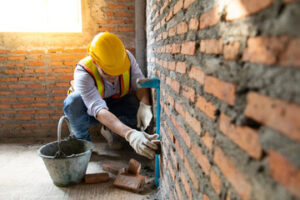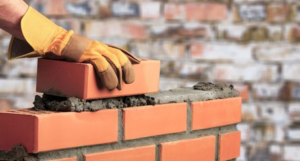Masonry Contractors Charleston SC construct and repair concrete, stone, brick, and other building materials. Their work creates impactful renovations that align with design vision and increase resale value.

Masons use individual bricks, stones, or blocks to form structures that offer both aesthetic appeal and structural integrity. Their expertise is vital for ensuring quality workmanship throughout the construction process.
Masonry contractors are experts at working with materials like brick, stone and concrete. They use their expertise to help renovate and repair structures, enhancing their aesthetic and structural integrity. They also have the skills to anticipate and solve problems that may arise during a project. When hiring a contractor, ask about their experience and what types of projects they’ve worked on in the past. It’s also important to find out whether they have a license to work in your area and carry liability insurance and workers’ compensation.
If you decide to hire a professional mason, make sure they have the necessary tools and equipment to complete the job. It’s a good idea to request quotes from several different contractors to compare pricing and services. Also, make sure the contractor you choose has a valid contract that includes the scope of work, timeline and payment terms. You should also find out if the contractor will handle inspections and required documentation.
Effective communication is another important factor when choosing a masonry contractor. They should be able to answer your questions about the project, explain their process and provide you with references. Make sure they have clear timelines for each stage of the project, as well as a point person who will be responsible for overseeing each aspect of the renovation.
Depending on the size of your project, you might want to consider hiring additional professionals for specific tasks, such as electricians or plumbers. A reputable masonry contractor should be able to coordinate with other contractors and provide you with references upon request.
Masonry projects are often complex, so it’s important to choose a qualified professional with experience in your type of project. When comparing contractors, look for those who have extensive experience and a proven track record of quality workmanship. You can also ask friends, family and neighbors for recommendations or consult local business directories and associations for masonry contractors in your area. Finally, make sure the contractors you interview have a clean, safe work environment and a clear plan for completing your project on time.
Experience
Masonry work requires specific essential skills to complete projects with quality and precision. Whether you are looking to remodel a stone patio, repair a chimney, or install a new driveway, you want to make sure the contractor you choose is experienced in the type of masonry work you require. You can do this by asking the right questions, evaluating quotes and contracts, and carefully reviewing finished results. This ensures that the project is completed to your satisfaction and enhances the functionality and beauty of your property.
A quality masonry professional is experienced with a range of different materials, from bricks to stones and concrete. This allows them to create unique and beautiful structures that stand the test of time. In addition, experienced contractors can solve challenges and problems quickly and efficiently, minimizing disruption to your home or business.
Another important consideration is safety. Experienced masons understand the hazards associated with construction sites and take steps to prevent accidents. For example, they may conduct a thorough site assessment before beginning a project to identify any potential issues, such as buried utility lines or unstable ground levels. They also follow best practices when handling heavy machinery and tools.
In addition to their technical expertise, a good mason will have strong communication skills. This enables them to clearly explain their proposal and answer any questions you might have. They will also be able to provide clear, detailed estimates, including the cost of materials and labor. This will help you compare estimates and select the right contractor for your project.
Lastly, a good mason will understand building codes and regulations. They will be able to comply with local requirements, which can help avoid costly delays or fines. They will also be able to complete inspections and submit required documentation. This is particularly important if you plan to sell your home in the future.
A masonry contractor with a strong reputation will likely have positive reviews and testimonials from past clients. These can be found online or in local business directories. You can also ask family members, friends, or neighbors for recommendations.
Availability
If you want to have your home’s brick, concrete, or stone work done quickly and efficiently, it is important to choose a contractor who is available. This is especially true for commercial projects, which can take weeks to complete. Having the right contractor can ensure that the job gets completed on time, and within budget.
In addition to their availability, you should also ask about how they will communicate with you throughout the project. This will help ensure that all your questions are answered and that the project is moving forward as planned. It is also important to discuss what kind of warranty or guarantee they offer on their work. This will give you peace of mind that your masonry work is guaranteed for a certain amount of time.
When selecting a masonry contractor, make sure that they are licensed and insured. This will protect you and your property from any issues that may arise during the construction process. It is also important to check if they have any previous experience working on projects like yours.
Masonry contractors are experts in the art of building with stone, brick, and other materials. They can build structures that will not only look great but also add value to your home. They can build anything from driveways and walkways to patios and decks. They can also create retaining walls to hold back soil and rocks. You can even have them install a new pool to enjoy your backyard.
It is important to select a contractor who has the right tools and equipment for the project. In addition, they should have the ability to meet any special requirements you may have. For example, if you need a particular type of stone for your project, they should be able to obtain it for you. They should also be able to give you a price quote for the entire project.
Using Joist can make it easier to keep track of all your estimates and costs for a masonry project. It’s easy to use and designed specifically for builders and contractors, so you can easily create a professional looking estimate that will impress your clients.
Pricing
Masonry contractors use their knowledge to build and repair structures from brick, stone, concrete block and cement. Their expertise helps to improve the aesthetic value and functionality of homes, businesses and public spaces. Masonry is a highly sought-after skill in the construction industry, as it contributes to the structural integrity and overall market value of buildings.
When hiring a masonry contractor, it’s important to understand their rates. Masonry professionals should provide a detailed estimate, including material costs and labor hours. Rates may vary depending on the size and complexity of a project, as well as regional regulations and taxes. In addition, hourly labour rates can vary by experience level and reputation. Getting multiple quotes from local masons can help you compare pricing, but be cautious of unusually low estimates that may indicate subpar materials or workmanship.
The type of materials used is a primary driver of masonry cost. Different types of brick, stone and concrete are available at varying prices and require different levels of skill to construct. The complexity of a project also impacts costs; intricate designs and patterns require more time to complete, which increases labor expenses. Regional factors can also impact prices, as areas with higher living costs tend to have higher masonry labor rates.
If you want to save money on your masonry project, consider exploring alternative materials and design options. Changing materials or simplifying your design can help reduce the overall cost of a project without sacrificing quality or functionality. Additionally, utilizing locally-sourced materials can help lower labor and transportation costs.
Masonry projects are not cheap, but they can be worth the investment in terms of curb appeal and resale value. Whether it’s a brick patio, paver walkway or chimney, these improvements increase home value and make your property more attractive to prospective buyers. With careful planning, hiring a qualified masonry professional can keep your project within budget while providing the high-quality results you desire. A reputable contractor can provide expert advice and solutions to meet your needs, while maintaining the highest standards of safety and craftsmanship.
